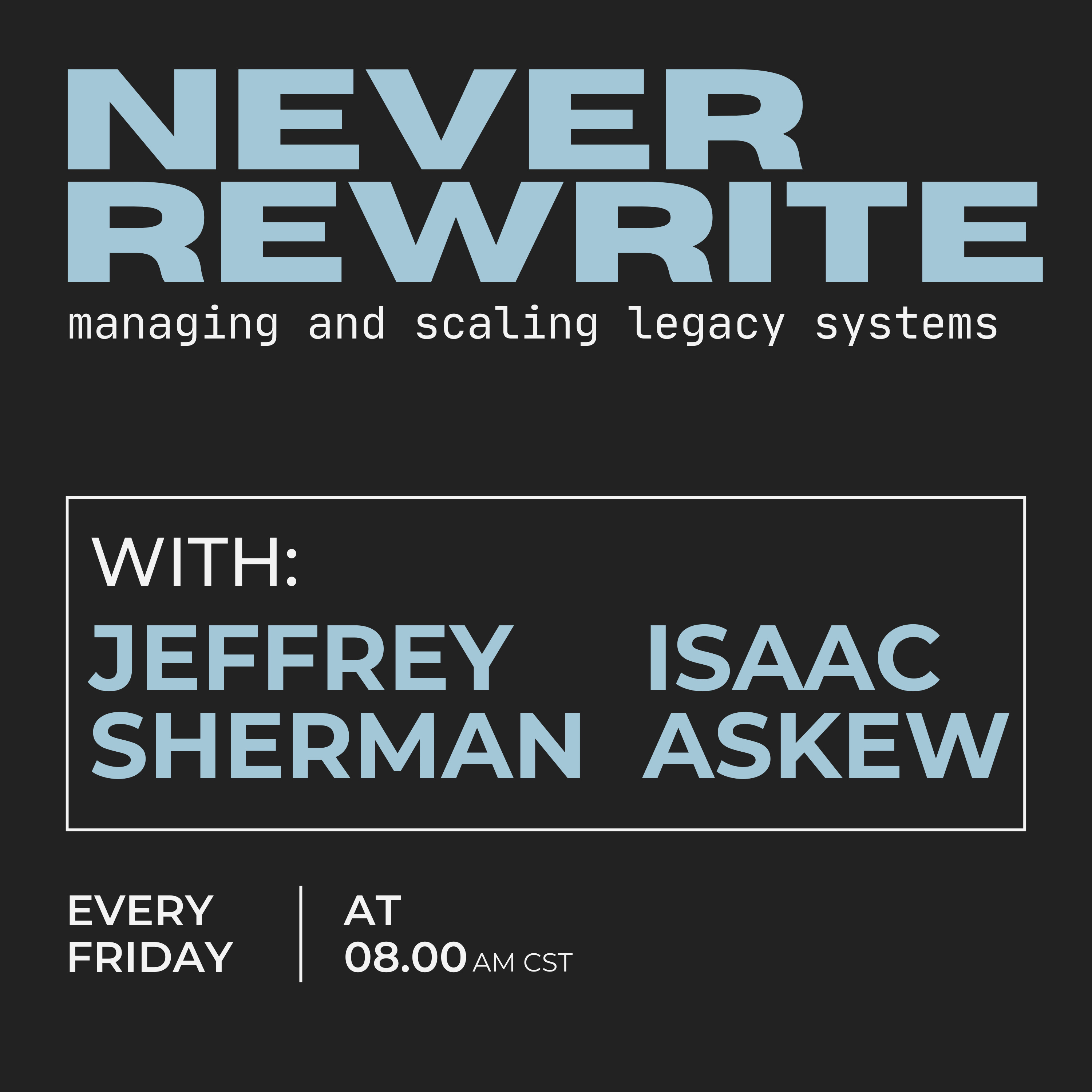

Never Rewrite
Isaac Askew and Jeffrey Sherman
‘Never Rewrite’ is a mantra of ours in the programming realm. Often times when software developers encounter nightmare codebases, the thought crosses their mind to work towards a rewrite, a port to a new language, or despair that their code is unfixable.
It’s not unfixable, and we explore how to get started along with an array of other software topics in our eponymous podcast.
It’s not unfixable, and we explore how to get started along with an array of other software topics in our eponymous podcast.
Episodes
Mentioned books

Jan 16, 2026 • 34min
Episode 139: Rewrites - A Failure of the Imagination ft. Mark Mandau
In this episode, Isaac Askew and Jeffrey Sherman are joined by Mark Mandau to explore the complex topic of software rewrites. They discuss the reasons behind the decision to rewrite software, the implications of neglecting maintenance, and the risks associated with such a drastic move. The conversation emphasizes the importance of understanding legacy systems, the role of leadership in decision-making, and the necessity of customer feedback in product development. Mark shares insights on how to approach the topic of rewrites with stakeholders and offers advice on maintaining existing systems to avoid the pitfalls of starting anew.

Jan 9, 2026 • 21min
Episode 138: The MVP Worked. Do We Rewrite It To Scale?
Isaac Askew and Jeffrey Sherman explore the complexities of rewriting a Minimum Viable Product (MVP) and whether such actions can be classified as a 'rewrite.' The conversation emphasizes the value of rewriting code that has proven to be effective and the need for new terminology in the software development community.

Jan 2, 2026 • 23min
Episode 137: 2025 Year in Review
Isaac Askew and Jeffrey Sherman reflect on their podcast's achievements in 2025, discussing their goal of producing 52 episodes and analyzing listener engagement through various metrics. They explore the most popular episodes, insights from analytics, and strategies for improving content engagement. The conversation also touches on future plans for 2026, emphasizing the importance of listener interaction and feedback.

Dec 26, 2025 • 14min
Episode 136: Key Questions to Ask When Navigating Your Career
Jeffrey Sherman and Dustin Rea discuss how to navigate career development, emphasizing the importance of understanding one's career stage, exploring various career paths, and being intentional about career choices. They highlight the significance of networking, shadowing others, and maintaining a dynamic career to avoid stagnation. The conversation encourages listeners to reflect on their goals and aspirations to shape their professional journeys effectively.

Dec 19, 2025 • 50min
Episode 135: Is Changing an ERP System a Rewrite? ft. Sophia Rosa
In this episode, Sophia Rosa, a project and organizational change manager, discusses the complexities of changing an ERP system. The conversation explores the definition of ERP, the challenges of customization, the importance of change management, and the need for user adoption and training. Sophia emphasizes the significance of communication from project sponsors and the role of mindfulness in managing change. The discussion also highlights the necessity of mock cutovers and the potential resistance to change from users, concluding with insights on how to navigate these challenges effectively.

Dec 12, 2025 • 24min
Episode 134: A Stream of Consciousness Chat on AI, Tech, & Layoffs
Jeffrey is out today, so we're joined by guest Thomas Morris to have a fun stream-of-consciousness style chat on what's on his mind these days.

Dec 5, 2025 • 15min
Episode 133: The Consequences of Having Multiple Sources of Truth
Isaac Askew and Jeffrey Sherman discuss a humorous yet insightful story about the challenges of managing market data in financial systems, particularly focusing on the consequences of having multiple sources of truth. They explore the technical aspects of market data protocols, the issues arising from unsequenced messages, and the eventual solutions implemented to address these problems. The conversation highlights the importance of data integrity and the lessons learned from software bugs in trading systems.

Nov 28, 2025 • 7min
Episode 132: A Thankful Thanksgiving Episode
Happy Thanksgiving everybody!

Nov 21, 2025 • 51min
Episode 131: Rewrites from a Product Perspective ft. Mark Mandau
Isaac Askew and Jeffrey Sherman engage with Mark Mandau, a principal consultant, to explore the complexities surrounding software rewrites. They discuss the dual perspectives of engineering and business, highlighting case studies like Facebook and Sonos to illustrate the risks and challenges associated with rewrites. The conversation delves into the pitfalls of code freezes, the doom loop effect, and the importance of customer feedback. Mark introduces the 'peak fix' approach as a structured alternative to rewrites, emphasizing the need for early engagement with consultants to navigate these challenges effectively.

Nov 14, 2025 • 23min
Episode 130: The Pains Caused by Differing Abstractions Pt. 2 - Real World Examples
SummaryIn this episode of Never Rewrite, hosts Isaac Askew, Dustin Rea, and Jeffrey Sherman discuss the real-life implications of leaky abstractions in software development. They share personal anecdotes about the challenges faced when dealing with time zone discrepancies, database case sensitivity, and the importance of user experience. The conversation highlights the need for continuous investment in software and the lessons learned from past mistakes, emphasizing the balance between perfectionism and business viability.


